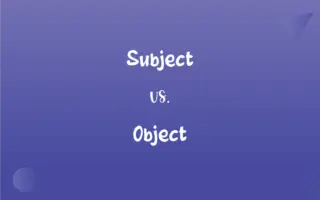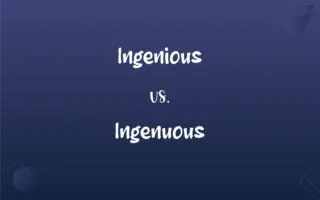Compound Sentences vs. Complex Sentences: What's the Difference?
Edited by Aimie Carlson || By Harlon Moss || Updated on October 25, 2023
Compound sentences combine two independent clauses using a coordinating conjunction; complex sentences join an independent clause with one or more dependent clauses.

Key Differences
Compound sentences and complex sentences are both integral structures in English grammar, aiding in the conveyance of nuanced ideas. Compound sentences essentially stitch together two independent clauses. These independent clauses can stand alone, but when joined by coordinating conjunctions like 'and', 'but', or 'or', they form a compound sentence.
Complex sentences, on the other hand, involve an independent clause and at least one dependent clause. The dependent clause cannot stand on its own as it requires the main clause for context. Subordinating conjunctions such as 'because', 'although', or 'when' often introduce these dependent clauses.
One can identify compound sentences through the presence of coordinating conjunctions or semicolons. For instance, "I wanted to play tennis, but it started to rain." Here, 'but' acts as the bridge between two separate thoughts. Complex sentences typically exhibit a shift in focus between the main idea and the additional information. An example would be, "I'll go to the store if I have enough money."
In terms of function, compound sentences offer balance and equilibrium between equally important ideas. Complex sentences, conversely, prioritize one idea over the other, providing depth and layering to the main thought. These sentence structures enhance textual coherence, allowing writers to express multifaceted viewpoints with clarity.
Comparison Chart
Basic Structure
Two independent clauses joined together.
One independent clause and one or more dependent clauses.
ADVERTISEMENT
Joining Elements
Coordinating conjunctions (e.g., 'and', 'but', 'or') or semicolons.
Subordinating conjunctions (e.g., 'because', 'although').
Standalone Clauses
Both clauses can stand as separate sentences.
Only the independent clause can stand alone.
Focus
Equal emphasis on both clauses.
Main emphasis on the independent clause; dependent clause adds detail.
Example
"She loves coffee, but he prefers tea."
"She'll join us if she finishes her work."
Compound Sentences and Complex Sentences Definitions
Compound Sentences
Joined by coordinating conjunctions.
The sun was setting, so we hurried home.
ADVERTISEMENT
Complex Sentences
Contains an independent and a dependent clause.
Although she was tired, she finished her assignment.
Compound Sentences
Sentences with two independent clauses.
She dances gracefully, and he sings melodiously.
Complex Sentences
Prioritizes one idea over the other.
While I enjoy hiking, my sister loves camping.
Compound Sentences
Expresses two equally important ideas.
The movie was thrilling, but it was too long.
Complex Sentences
Presents primary information with supporting details.
He went home early because he felt unwell.
Compound Sentences
Offers balance between two separate thoughts.
They wanted to visit Paris, or they could go to Rome.
Complex Sentences
Uses subordinating conjunctions.
I'll bake a pie if I have the ingredients.
Compound Sentences
Can use a semicolon for connection.
He is a talented artist; his paintings are in galleries worldwide.
Complex Sentences
Dependent clause provides context to the main clause.
When the rain stopped, we continued our journey.
FAQs
What is a compound sentence?
A compound sentence is a sentence that contains at least two independent clauses joined by a coordinating conjunction or a semicolon.
What are the coordinating conjunctions?
The coordinating conjunctions are: for, and, nor, but, or, yet, and so (often remembered by the acronym FANBOYS).
How do punctuation rules differ between compound and complex sentences?
Compound sentences often use semicolons or commas with coordinating conjunctions, while complex sentences use commas especially when starting with a dependent clause.
Can a semicolon replace a coordinating conjunction?
Yes, a semicolon can join two independent clauses without a coordinating conjunction.
How are dependent clauses introduced in complex sentences?
Dependent clauses are often introduced by subordinating conjunctions like although, because, since, unless, and while.
Can a complex sentence begin with a dependent clause?
Yes, it can. For example: "Although she was tired, she finished her homework."
Are relative pronouns related to complex sentences?
Yes, relative pronouns like who, which, and that can introduce dependent clauses in complex sentences.
Example of a compound-complex sentence?
"She loves to read, so she visited the library, and while she was there, she found a rare book."
Can overusing compound or complex sentences be problematic?
Yes, overusing them can make writing overly complicated. It's important to balance with simpler sentence structures for clarity.
What's a common mistake with compound sentences?
A common mistake is the comma splice, where two independent clauses are joined with just a comma and no conjunction.
What's the main difference between a compound and a complex sentence?
A compound sentence has two or more independent clauses, while a complex sentence has one independent clause and at least one dependent clause.
Can a sentence be both compound and complex?
Yes, it's called a compound-complex sentence and contains at least two independent clauses and at least one dependent clause.
Which sentence structure is more common in formal writing?
Complex sentences are often more common in formal writing because they can convey nuanced ideas.
What's a common mistake with complex sentences?
A common mistake is not properly punctuating dependent clauses, especially when they start the sentence.
Can a compound sentence have more than two independent clauses?
Yes, it can have multiple independent clauses, but they need to be properly connected using coordinating conjunctions or semicolons.
Example of a compound sentence?
"She wanted to play tennis, but it started to rain."
What is a dependent clause?
A dependent clause is a group of words that has a subject and a verb but cannot stand alone as a complete sentence.
Why use compound sentences in writing?
Compound sentences can show the relationship between two closely related ideas, add variety to sentence structures, and make writing more engaging.
What is a complex sentence?
A complex sentence is a sentence that contains one independent clause and at least one dependent clause.
Why use complex sentences in writing?
Complex sentences can convey cause and effect, contrast, or other intricate relationships, and can add depth to the writing.
About Author
Written by
Harlon MossHarlon is a seasoned quality moderator and accomplished content writer for Difference Wiki. An alumnus of the prestigious University of California, he earned his degree in Computer Science. Leveraging his academic background, Harlon brings a meticulous and informed perspective to his work, ensuring content accuracy and excellence.
Edited by
Aimie CarlsonAimie Carlson, holding a master's degree in English literature, is a fervent English language enthusiast. She lends her writing talents to Difference Wiki, a prominent website that specializes in comparisons, offering readers insightful analyses that both captivate and inform.































































